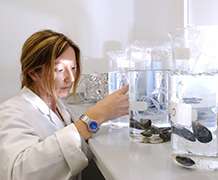Rising ocean acidity threatens sea life

Researchers in Exeter have found that sea creatures will be affected by rising ocean acidity.
Increasing levels of carbon dioxide in our atmosphere are changing ocean chemistry, making seawater more acidic. This poses a potential threat to some sea life as it creates conditions for animals to take up more coastal pollutants like copper.
The research, published in the journal Environmental Science and Technology found that lugworms, the favourite bait of anglers, suffer DNA damage as a result of copper from polluted sediments. The copper harms their sperm, and their mis-shapen babies live only a few days.
Dr Ceri Lewis from Biosciences said "It's a bit of a shock, frankly. It means the effects of ocean acidification may be even more serious than we previously thought. We need to look with new eyes at things which we thought were not vulnerable."
The UK's Chief Scientist, Professor Mark Walport, has warned that the oceans face a serious and growing risk from carbon emissions from mankind.
"Carbon dioxide from our cars, homes and factories has made seawater 25% more acidic.
"The changes represent a substantial risk to complex marine food webs and ecosystems. The current rate of ocean acidification is unprecedented within the last 65 million years."
Journal information: Environmental Science and Technology
Provided by University of Exeter


















